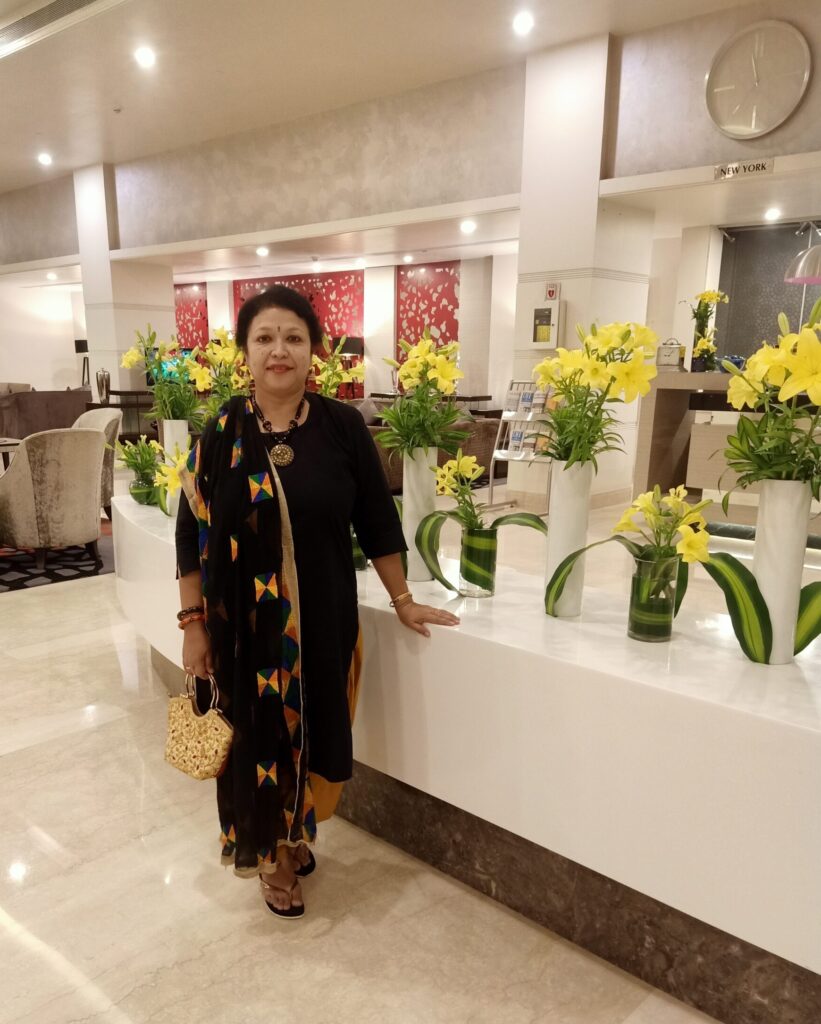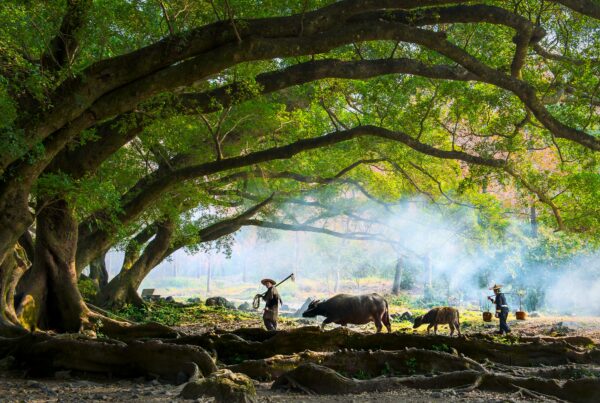This short story was published on Story Sanctum, a Chicago-based publishing house, in March, 2025.
Which is the more difficult thing to do – love your immediate surroundings for the way they nurture you? Or hate them for all that they’ve taken away from you?
Such fleeting questions do crisscross our minds occasionally. Sometimes they just peek in and sidle out; at others, they linger for a while. Pretty much like the ebb and flow of the river flowing nearby. But ruminating on them is a luxury we can ill afford. There are more compelling things we need to attend to. Like, examining the safeness of our mud huts. As one more evening descends, we shut the rickety wooden doors tight and pray for an uneventful night. It’s not that we have anything special to look forward to. Or fear. There is nothing alluring about us. We are a motley mix of women – old and young, tall and short, rounded and petite. Ones with an ebony tinge and sculpted faces, or those with sallow skin and jaded looks. But there’s one common thread that binds us together. We are all condemned to a life of routine and sameness, so much so that we have consciously started seeking it out, instead of looking for alternatives.
This banality has a strange comfort and solace to it. It keeps us cocooned within its layers of predictability. We have already faced enough surprises, coped with innumerable changes, and seen complete turnarounds in our destiny. Now we crave stability. Like the monotonous meal we consume every night – steamed rice and runny lentils tempered with turmeric, salt and green chilli. If we get lucky, we throw in some diced vegetables which swim in the pools of lentil. Lunch, of course, is better. We have fish, shrimp, crab – whatever we manage to haul from the periphery of the saline river. Venturing out too far into the waters is a strict no-no for the uninitiated like us. Can we ever forget how some of our most experienced ones never returned?
The walls of the huts are regularly smeared with fresh clay that we fetch from the riverbanks. That, and the thatched roofs made of dried pili grass and golpata (palm leaves), help keep the huts marginally cool at night. We gently twist the knob of the kerosene lantern and lower the flame until only a tiny speck of fire remains, bobbing and flickering in the sparse air inside the hut. We never keep our homes in complete darkness. We need a fire burning right through the night to ward off our dreaded predators – the striped, ochre Royal Bengal tiger. And sometimes, their biped human counterparts, too.
During the day, things look different. Much safer. The numerous distributaries of the mighty Ganga, Brahmaputra and Meghna snaking through these saline regions of south Bengal are dotted with dense mangrove forests. An environmentalist’s delight…a veritable gold mine for the tourism sector. To the unsuspecting, casual tourists, it is just another cluster of huts in a nondescript island which they sight through their designer sunshades and fancy binoculars, while cruising through the riverine delta. But for anyone who cares to scratch the surface and peek underneath, we are the unwitting players thrust into this sinister zone of intense human-animal conflict.
We have been gifted several monikers –evil, unholy, witch, bad omen, swami khejo (husband eater). We lap them up as freebies…badges of honour to add a spark to our otherwise bleak lives. In fact, there’s another name that almost makes us laugh. The name coined by the genteel townspeople to address us, almost with a hint of respect and sympathy. They call us the Bagh Bidhobas – the Tiger Widows of the Sunderbans – cursed women who have lost their husbands to deadly tiger attacks. And this, is a special village earmarked for us. An ostracised community of widows – condemned by fate; shunned by their kin.
But we were not always in such dire straits. All of us had happy, wholesome families with husbands and children. Some of us also had aged in-laws or parents living under the same roof – families that bore the stamp of normalcy and honour. Families which worked hard, prayed harder, celebrated births, and mourned deaths. We had always been victims of abject poverty but we didn’t seem to mind that. As long as we had our husbands and family around us. Husbands who occasionally hit us when they were drunk and later, made love to us. Husbands who would venture deep into the forests to collect honey because the denser the forests, the better is the honey. And greater are the chances of being mauled. Husbands who would set off on their rowing boats with fishing nets, cooking paraphernalia and daily essentials in tow, to last at least a fortnight. Around sundown, they would wade in knee-deep water to spread their nets. Or balance themselves on the slushy banks to secure the stumps of the fishing nets, in the hope of hauling up a rich harvest of big and small fish and orange crabs through the night.
In the evening, when we lit a lamp before the goddess at home, we would visualise our men relaxing on their boats, cooking on a slow woodfire, humming a soulful bhatiali ditty about home and hearth. But beyond this lyrical, imaginary vision lurked a harsh prosaic reality. The rising winds would carry the tune far and wide. To the lovelorn hearts of fellow fishermen who had left their women behind and were braving the forests, rivers and tides. And also to those, who lay in wait amidst the Sundari and Gewa trees until they found the right moment to strike. Suddenly, the earthy, full-throated singing voice would be drowned under a deafening roar…and replaced by a bloodcurdling cry for help! Followed by a scrrrunch of bones being broken, a neck being wrung, and several pairs of panicky feet bolting across the mudflats and sandbars to higher ground, before an eerie silence descended on the river.
Like everything else in this region, religion, too, has its fair share of peculiarities. All of us living in the throes of danger, unanimously bow our heads to our reigning deity, Maa Bonbibi. Hindus and Muslims alike. But more so, the menfolk who forage the forests every day for sustenance. Every time our husbands are out, the onus to placate the goddess invariably falls on us, the women. We are expected to lead a pure, austere life, praying for the well-being and safe return of the men. And God forbid, if a couple of them fails to return, the wives are promptly branded ‘impure’ and ‘sullied’. We are banished from our homes and the village. The slur of immorality is so potent that we lose the right to cultivate our family land. Or even use our family boat – the kaajer nouko – for sailing and fishing, lest we taint it.
We try to fight for our marital homes, our children, our family fishing ponds and tracts of land. We try to argue with the village honchos and family elders.
Parul’s husband died of snake bite amidst the lush mangroves. Sakina lost her man to a deadly crocodile attack while sailing down the creek. But they continue to live in the comfort of their homes, with the rest of their family. They have not been labelled ominous or unchaste. How is a tiger attack any different? Why single us out and punish us for something we have no control over?
It is an exercise in futility. We already know the answer. The tag of dishonour has been ingrained deep in our collective psyche. The lack of rationale makes us laugh, even in such grim circumstances.
The last nail in the coffin of our woes is the absence of financial support from the government. Our husbands, like most of our community members, had ventured into the forests and used the resources without a licensed permit. How could we afford these expensive documents when providing two square meals to the family every day was a burden by itself? In the absence of legitimate papers, we are too scared to seek help from the police or approach the babus for compensation. What if we get booked for illegal entry and use of forest resources? And sometimes, when the tiger leaves no trace of the body, we are forced to treat it as a ‘missing person’ case. Poor Jamila still wails and mourns for her husband who was pulled off the edge of the boat by the beast in the middle of the river. His companions could only shriek in helplessness and horror. Two months down, Jamila still hopes that her husband will return some day. We don’t have the heart to tell her otherwise!
Recently, the Nurse Didi visiting the primary health centre in the adjoining village had mentioned something about the world becoming hotter, about the seas rising. That, apparently, made the rivers more saline. When we asked her how, she was not able to tell us. But we did not mind. The fragile ecosystem around us is like our birthing cradle. We know it like the back of our hands. We can feel the imbalance in our pulse. We can see how our tiny patches of land are gradually becoming uncultivable. There is a deep rot that is threatening to swallow us whole. Is it threatening the tiger, too? Are these animals losing their habitat, their prey, and hence, sneaking inland in search of food?
The summer months here are very hot and humid. The sun beats down on us mercilessly. We sweat in buckets. There is a silent heaviness in the air, as if a disaster is going to strike. Our arms ache as we vigorously swing the hand-held palm leaf fan. We still shudder when we remember Nolok, the little girl who was dragged away by the tiger from outside her hut. The ten-year-old was playing ludo with her kid brother, enjoying the cool evening breeze. The beast apparated out of the darkness and pounced on Nolok from behind. The stub of the burning candle did little to deter him, so desperate was he! The poor child did not stand a fighting chance of escape. Her body was never found. Her brother continues to have nightmares and screams pitifully in his sleep.
Most of us do not talk much among ourselves. We don’t need to. Our eloquent silence speaks volumes. Our hollow eyes mirror the agony of unshed tears. Our shared losses echo aeons of collective rankling. On the surface, each of us is like a port of calm, offering solace and refuge to the other battling a storm. Deep inside our hearts, each one is a simmering cauldron of discontent and angst, trying hard not to explode. We remember the joyful moments of our past and our eyes well up. The imprints of our challenging times brace us for future hardships. The river is our lifeline – it provides us with everything we need. And in one cruel stroke, it takes it all back…often, with compound interest. It is our raison d’etre as well as our nemesis, reminding us of the fragility we live through.
To supplement our peripheral existence, some of us had taken loans from the bank to dig ponds and start cultivating fish. It required backbreaking work and a fair amount of luck. Finally, our resilience and hard work won. We would sell the fish at the haat, the bi-weekly village market, and bring home some cash. This continued for a couple of years. Our children started dreaming again – dreaming of buying a new dress for Durga Puja or a pair of slippers for using outdoors. Moving barefoot along the mud tracks had calloused their tender skin. Or of visiting the Sharadiya Mela in the nearby town, the autumnal fair heralding the annual visit of Maa Durga. We felt happy for our children…happy to see them harbouring dreams, thinking of the future. What is a life without dreams, goals and hope, after all?
And just when we were audacious enough to believe that our fortunes had turned, a deadly cyclone struck. For us, it was like a tsunami – all-pervading, cataclysmic, almost diabolical in nature. Is it our imagination, or was the Widow Village actually the worst hit in the whole of the Sunderbans? It battered our lands, flattened our huts and sheds, and flooded our farmlands and fish ponds. And most importantly, it washed away all our dreams and our enterprise in its swirl of murky waters. When the cyclone calmed and the waters receded, we were greeted by dead farm animals, rotten fish washed ashore, and broken mud embankments. Our limited cultivable patches were submerged under a residue of salt. Once again, we found ourselves on ground zero.
It has been a year since. Fate has its quirky way of testing us – the most vulnerable lot, the easiest target. And it is Fate, again, which resurrects us from the nadir of despair. Most of us have picked up the frayed threads of our tattered existence and slowly stitched them back into the fabric of life. But not everyone has been so resilient, so persevering, so mulish, to be treading the same torturous path time and again. Not everyone can handle a litmus test with equanimity. And the losses have truly been irrevocable. It is as if we were born to be destiny’s favourite play things – toyed with, tossed around, and broken at whim. And as is the case with damaged toys, some of us were beyond repair or revival. Some of us had reached the end of our tether. Hence predictably, some of us snapped.
As always, it is easy to strike a nasty blow when one is down on one’s creaky knees. For us, this blow has come in the form of fairy tale illusions and promises of respite and riches. Subtly proffered by unholy money-lenders, and city-based pimps disguised as recruitment agents. It is not that we’re unaccustomed to being leered at. Earlier it was the village men with their furtive glances measuring us up and down. And now, by these middle-aged, paunchy money-lenders and agents – their beady eyes following us, gazing unabashedly at our saree-clad frames, boring into our curves. Our sarees are hitched up to our calves to avoid the wetland slush, exposing our lower limbs. They ogle at those few inches of bare skin, libido writ large on their lined faces.
The surreptitious movements of strangers, the unfamiliar lusting faces, the clandestine meetings at the fringes of the woods, an unprecedented busyness evident in some of the women – it’s not that we did not notice these tell-tale signs. Dark clouds brewing a tempest. Those unmistakable bleeps presaging a desperate act of survival. But what could we possibly do? Wait infinitely for better days to dawn on us? Hope for a life free of tigers, crocodiles, snakes, and cyclones? Or act like those three widows who chose to throw themselves at the far end and swim their way up. Unapologetic about their decision. Confident of their action.
One of them was a new bride – her husband wanted her to sample the best honey from the interiors of the jungles. She only received his mangled remains. Very soon, she wanted to break free of this tedium. She wanted to breathe…to live. Not just inhale and exhale, like the rest of us. One had two young children who blamed her for pulling them out of the school in the neighbouring village. Children, who were too naïve to understand the diktats of a stratified community, or the constraints of poverty. She entrusted them with the rest of us and left, hoping to provide her children with a better, secure future. And then there was a third, who was finding it impossible to sustain her ailing, infirm parents who depended solely on her for succour. Faith and prayer can probably move mountains but they can not ensure healthy ageing. That requires nutrition and therapy. And both, in turn, need hard cash.
Many of us are caught in the throes of a dilemma – should we give in to temptation and run away? Should we refuse to be typecast in this shared template of pain and penury? Or, should we continue to lead our woebegone lives where we merely exist, only because we do not know what else to do. This dilemma is no longer an elephant in the room. It has taken the proportions of a mammoth, bulldozing its way into our hearts, our conscience, till we can no longer afford to ignore it. More so, when we receive news of our friends who left these sinking marshlands in search of terra firma. And instead, lost their way in the city’s labyrinthine alleys where women ply their trade at night. Where our young bride’s rose-tinted dreams are dashed every minute by the garish reality of the world’s oldest profession. Where the mother silently suffers scars every night so she can pluck the stars for her children at dawn. Where the daughter of our village withers and wastes her fragile self in the hope of buying a panacea for her hoary parents.
Back home, we represent the meek, unambitious women, cowering and grovelling before our destiny, seeking pardon for crimes we have not committed. We are the permanent outliers – accused of infidelity, sundered and cast away like we never existed. We have learnt to lead such a life with stoical acceptance. We prefer to remain nameless, faceless statistics in moth-eaten registers gathering dust in panchayat offices. We enjoy the anonymity it offers. We till our tracts, visit the river to get fish or crab, and venerate the aura of Maa Bonbibi. At sunset, we dutifully return to the confines of our home, like birds returning to their nests at dusk. Occasionally…just sometimes…some of us don’t. Like those rare birds who lose their way and drift away, never to return to their familiar folds and to their chicks again. Frankly, no one bothers. No one keeps count of those birds lost in flight. Or of the women who do not return from the marshes.
For once, they are not preyed upon by the tiger. This time the hunger is in their belly. It is an irresistible urge, a strong voice of dissent – to march away from the beaten path of submission and instead, tread the irreverent route of comfort and pleasure. It is as if they are under a hypnotic spell, following the mesmeric twinkle of a firefly, only to find themselves trapped in a bog, chasing the ungodly gleam of an ignis fatuus. But by the time they realise it, it is way too late.
Such incidents follow a routine trajectory. They jolt the urban moral police out of their ennui. This is followed by newspaper headlines demanding an enquiry into the deaths and the cases of people gone missing. They seek justice and compensation for the rest of us. And after this byte has been played out on loop, they return to their timetabled life and wait for the next sensational news to crop up.
We continue to walk on thin ice day after day, waiting for the disturbing ripples to ease out. We yearn to return to our lives where the tiger and the river rule the roost. But in our heart we already know, that’s not how it’s meant to be. We keep hoping there won’t be any more spicy newspaper snippets on our runaway widows. We keep praying that the outsiders stop invading our lives by day, and our homes at night. We keep wishing that the old abandoned parents live on for a few more years. And that, the bright young children pick up their satchels and head to school so there are no more generations of Bagh Bidhobas.
P.C. Maitheli Maitra on Unsplash









